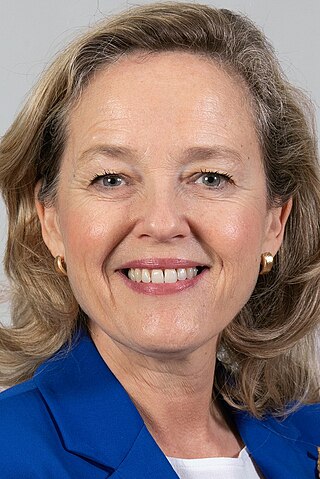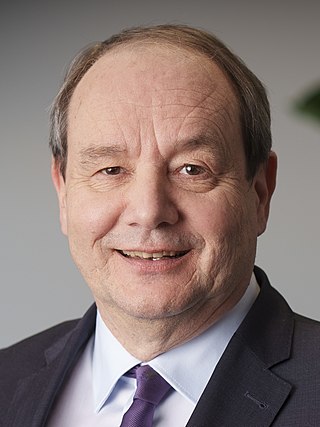Related Research Articles

The euro area, commonly called the eurozone (EZ), is a currency union of 20 member states of the European Union (EU) that have adopted the euro (€) as their primary currency and sole legal tender, and have thus fully implemented EMU policies.

Jean-Claude Juncker is a Luxembourgish politician who was the 23rd prime minister of Luxembourg from 1995 to 2013 and 12th president of the European Commission from 2014 to 2019. He also was Finance Minister from 1989 to 2009 and President of the Eurogroup from 2005 to 2013.
EWG may refer to:

Paschal Donohoe is an Irish Fine Gael politician who has served as Minister for Finance since January 2025, and previously from 2017 to 2022. He has been a Teachta Dála (TD) for the Dublin Central constituency since 2011 and President of the Eurogroup since July 2020. He served as Minister for Public Expenditure, National Development Plan Delivery and Reform from 2022 to 2025, Minister for Public Expenditure and Reform from 2016 to 2020, Minister for Transport, Tourism and Sport from 2014 to 2016 and Minister of State for European Affairs from 2013 to 2014.

The Economic and Financial Affairs Council (ECOFIN) is one of the oldest configurations of the Council of the European Union and is composed of the economics and finance ministers of the 27 European Union member states, as well as Budget Ministers when budgetary issues are discussed.

The Eurogroup is the recognised collective term for the informal meetings of the finance ministers of the eurozone—those member states of the European Union (EU) which have adopted the euro as their official currency. The group has 20 members. It exercises political control over the currency and related aspects of the EU's monetary union such as the Stability and Growth Pact. The current president of the Eurogroup is Paschal Donohoe, the Minister for Public Expenditure, National Development Plan Delivery and Reform of Ireland.

The economic and monetary union (EMU) of the European Union is a group of policies aimed at converging the economies of member states of the European Union at three stages.

The European Financial Stability Facility (EFSF) is a special purpose vehicle financed by members of the eurozone to address the European sovereign-debt crisis. It was agreed by the Council of the European Union on 9 May 2010, with the objective of preserving financial stability in Europe by providing financial assistance to eurozone states in economic difficulty. The Facility's headquarters are in Luxembourg City, as are those of the European Stability Mechanism. Treasury management services and administrative support are provided to the Facility by the European Investment Bank through a service level contract. Since the establishment of the European Stability Mechanism, the activities of the EFSF are carried out by the ESM.

The European Financial Stabilisation Mechanism (EFSM) is an emergency funding programme reliant upon funds raised on the financial markets and guaranteed by the European Commission using the budget of the European Union as collateral. It runs under the supervision of the Commission and aims at preserving financial stability in Europe by providing financial assistance to member states of the European Union in economic difficulty.

The European Stability Mechanism (ESM) is an intergovernmental organization located in Luxembourg City, which operates under public international law for all eurozone member states having ratified a special ESM intergovernmental treaty. It was established on 27 September 2012 as a permanent firewall for the eurozone, to safeguard and provide instant access to financial assistance programmes for member states of the eurozone in financial difficulty, with a maximum lending capacity of €500 billion. It has replaced two earlier temporary EU funding programmes: the European Financial Stability Facility (EFSF) and the European Financial Stabilisation Mechanism (EFSM).

Jeroen René Victor Anton Dijsselbloem is a Dutch politician and economist serving as Mayor of Eindhoven since 13 September 2022, succeeding John Jorritsma (VVD). A member of the Labour Party (PvdA), he has also been Chairman of the supervisory board of Wageningen University since 1 April 2019.

Vittorio Grilli is an Italian economist and academic. He was Italy's minister of economy and finance from 2012 to 2013 as part of the Monti cabinet.
The European banking union refers to the transfer of responsibility for banking policy from the member state-level to the union-wide level in several EU member states, initiated in 2012 as a response to the 2009 Eurozone crisis. The motivation for the banking union was the fragility of numerous banks in the Eurozone, and the identification of a vicious circle between credit conditions for these banks and the sovereign credit of their respective home countries. In several countries, private debts arising from a property bubble were transferred to the respective sovereign as a result of banking system bailouts and government responses to slowing economies post-bubble. Conversely, weakness in sovereign credit resulted in deterioration of the balance sheet position of the banking sector, not least because of high domestic sovereign exposures of the banks.

The Economic and Financial Committee (EFC) is a European Union advisory body, defined by the article 134 of the Treaty on the Functioning of the European Union. Its president is also the president of the Eurogroup Working Group, which prepares dossiers for approval by the Eurogroup, whose decisions are generally ratified by ECOFIN.

Thomas Wieser is an American-Austrian economist working for the European Union. He was the president of Economic and Financial Committee (EFC) of the EU as well as the president of the Eurogroup Working Group (EWG), both advisory bodies of the Eurogroup, until February 2018.

Ivan Lesay is a Slovak political scientist, economist, civil servant, columnist and writer. In the years 2015–2017, he served as State Secretary of the Finance Ministry.

Nadia María Calviño Santamaría is a Spanish economist and civil servant serving as the President of the European Investment Bank since January 2024.

Johannes Alexander "Hans" Vijlbrief is a Dutch civil servant, economist, and politician, currently serving as a member of parliament for the social-liberal party Democrats 66 (D66). He previously served as State Secretary for the Extractive Industries in the Fourth Rutte cabinet.

Tuomas Saarenheimo is a Finnish civil servant, who currently serves as the President of the Eurogroup Working Group.
References
- ↑ "Eurogroup: Tuomas Saarenheimo appointed President of the Eurogroup working group". European Council (Press release). 17 February 2020. Retrieved 14 March 2020.
- ↑ Jim Brunsden and Mehreen Khan (December 14, 2017), Dutchman set to become new head of Eurogroup Working Group Financial Times .
- ↑ Uwe Puetter. The European Council and the Council: New intergovernmentalism and institutional change. Chapter 4.5.1 The EFC and the Eurogroup Working Group. Pages 192-195. Oxford University Press. Sep 18, 2014. ISBN 9780198716242.
